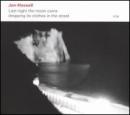FLYING LOTUS - Cosmogramma
 Tuesday, June 1, 2010 at 10:00AM
Tuesday, June 1, 2010 at 10:00AM  When I first saw that Ravi Coltrane (son of, well, you know who...) was a guest on Cosmogramma, my curiosity was immediately piqued. After all, despite his legendary pedigree, Ravi is hardly a well-used sideman in electronic circles. Of course, then I quickly found out that Steven Ellison (aka Flying Lotus) is the saxophonist's cousin. Ellison's aunt and Ravi's mum, Alice Coltrane, was a truly exceptional figure. From her coming out in 1965 as a pianist in her husband John's late- period quintet, she grew into a remarkable bandleader in her own right—in particular, her late 60s/early 70s albums are all canon-worthy works of psychedelic, tranced-out jazz (especially when she turned to the harp as her main instrument).
When I first saw that Ravi Coltrane (son of, well, you know who...) was a guest on Cosmogramma, my curiosity was immediately piqued. After all, despite his legendary pedigree, Ravi is hardly a well-used sideman in electronic circles. Of course, then I quickly found out that Steven Ellison (aka Flying Lotus) is the saxophonist's cousin. Ellison's aunt and Ravi's mum, Alice Coltrane, was a truly exceptional figure. From her coming out in 1965 as a pianist in her husband John's late- period quintet, she grew into a remarkable bandleader in her own right—in particular, her late 60s/early 70s albums are all canon-worthy works of psychedelic, tranced-out jazz (especially when she turned to the harp as her main instrument).
So why the family tree? Because this ancestry definitely adds something of an understanding of what Flying Lotus is after on his excellent Cosmogramma LP. From the mystic sketched artwork covered in Arabic script to the restlessly open nature of the music within, this is a very worthy successor to the kind of aural voyage his aunt began in the '60s and '70s. Mind you, this is still a modern record—a product of computers, technology and the possibilities these devices open to us. But FlyLo is constantly looking for ways to connect the two eras. The result at times is one of the more 'classic'-sounding electro/hip hop records you're likely to hear this year.
Hip hop in general has a strong presence here, but unlike DJs such as Madlib, it's one of the few musical histories that's not really mined for material on Cosmogramma. Instead, it's used to refract other styles into pleasing and surprising new shapes. The mid-record trio of "Arkestry", "MmmHmm" and "Do The Astral Plane" is a mini-suite of resonant jazz drums, searching sax, early-evening soul and disco all viewed through a hip hop lens. Elsewhere, we're treated to minimalist psych, bursts of 8-bit noise, tight percussion loops, and even a game of table tennis transformed into a loping rhythm. It's telling that maybe one of the least successful moments on the record is the collaboration with Thom Yorke—not so much because it's a bad song, but more that hearing the Radiohead frontman whisper sweet, incomprehensible nothings over skipping electro-beats ain't exactly new territory.
But thankfully for Ellison, the rest of Cosmogramma is entirely top drawer stuff. And when he drops a little nod to Alice on "Drips / Auntie's Harp", you know it's a mention that would make the dearly departed icon proud.
 Electronic,
Electronic,  Hip Hop
Hip Hop 





















